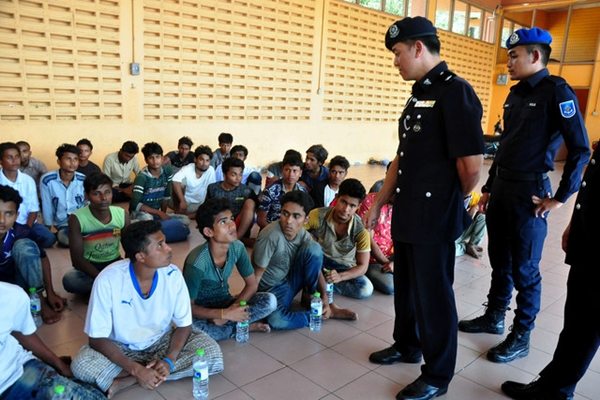Police looking over the Rohingya refugees. – Bernama file photo
KUCHING (June 20): The Human Rights Commission of Malaysia (Suhakam) has urged the government to adopt comprehensive, inclusive and long-term refugee protection policies in the country amid the Covid-19 pandemic.
Suhakam made this call today in conjunction with the World Refugee Day, which is commemorated every June 20. This year’s theme is “Together we heal, learn and shine”.
“According to the data from the United Nations High Commission for Refugees (UNHCR) in Malaysia, as of May this year, there were 179,570 registered refugees and asylum-seekers, of whom 45,980 of them are children below the age of 18.
“Their vulnerabilities remain, as their access to basic needs such as education, healthcare, and social protection are still not a given, even for UNHCR card holders.
“Suhakam recognises the need for co-operation between UNHCR in Malaysia, government agencies and civil society organisations whose combined efforts would allow for refugees to receive the care they need and protection they seek,” said Suhakam in a statement.
In managing the pandemic, Suhakam hoped that the government will uphold the principles of leaving no one behind, by ensuring refugees are included in the national vaccination programme and provided safe spaces to receive it.
It said the government ought to maintain its international leadership in terms of deepening co-operation with regional and international communities.
“These communities include Asean, the United Nation’s agencies and its special procedures, and the OIC, among others, to identify lasting solutions to the longstanding refugee issues in Southeast Asia.”
Suhakam also appealed to Malaysians to understand the unfortunate circumstances faced by refugees, who are forced to flee from their home country to Malaysia’s shores, seeking a temporary place for their safety and survival.
It added: “Malaysians, as a whole, should undertake to ensure the refugee community in the country will be treated with dignity and have their basic needs met, ultimately leading to a more humane, just, inclusive, and equal society.”


